28 Feb 2019 - {{hitsCtrl.values.hits}}
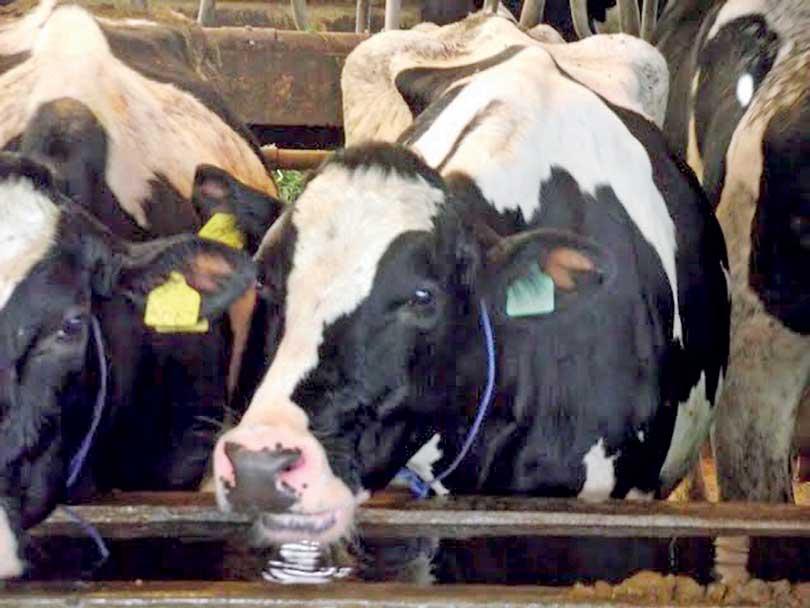
 Sometime ago people had the habit of leveling allegations against certain authorities that they were involved in doing ‘ Harak weda’ (things unbecoming of them). This story is about such an act which is unbecoming of humans. Their modus operandi has brought ill fate not only for the Government, but to local investors and a large number of dairy farmers.
Sometime ago people had the habit of leveling allegations against certain authorities that they were involved in doing ‘ Harak weda’ (things unbecoming of them). This story is about such an act which is unbecoming of humans. Their modus operandi has brought ill fate not only for the Government, but to local investors and a large number of dairy farmers.
It seems that the discussion about the import of dairy cows with the private sector began in 2006, according to old cabinet papers and other documents. The development of local milk production was mentioned in the Government policies in 2006.
The ministers who were in charge of this subject during previous governments had presented Cabinet Papers from 2007 to 2017 saying that they had done so with the aim of increasing milk production. Among those ministers were the former President Mahinda Rajapaksa, former ministers such as C.B. Ratnayaka, Basil Rajapaksa and Thondaman. During these times, newspaper advertisements were also published with regard to the import of dairy cows. In the year 2007, tenders were called for the selection of a contractor for the import of dairy cows.
However, as the first stage of the project to import of dairy cows, 500 and 1500 dairy cows had been imported in 2012 (March) and 2013 (January) respectively. Those cows had been allocated for three dairy farms, namely Bopaththalawa, Menikpalama and Dayagama. These farms belonged to the National Livestock Development Board. During the second stage, 2495 dairy cows had been imported in 2015 and handed over to NLDB Ridiyagama farm, situated in Hambantota. Dairy cows had been given to Hambantota, a place where the climate is unsuitable to rare diary cows. This decision was also taken without conducting a feasibility study. According to the observations of the Auditor General, the Cabinet Papers presented between 2007 to 2015 were contrary to each other. As a result of these projects, the Government was compelled to sustain a loss and the officials concerned had to face chaotic situations on several occasions.
Under these circumstances the approval had been given on January 13, 2004 for the Cabinet Paper presented for the import of 20,000 dairy cows and their distribution among the farmers within two years as the third stage of the project. It has been stated in that Cabinet Paper that the discussion had been initiated for obtaining loans from a bank in The Netherlands and the approval had been sought for signing that agreement with the bank concerned by the former President Mahinda Rajapaksa. According to the Cabinet Paper presented on June 5, 2014 , the estimated cost of this project was 73.95 million US dollars.
However, this project was stopped on the way as a result of a change of Government in 2015. The present Government came to power in 2015 on the promise that legal steps would be taken against the corruptions and malpractices that took place during the Rajapaksa regime. This project was recommenced despite the fact that some people were of the opinion that the project of importing dairy cows would be stopped halfway, in a bid to find fault with it.
Cabinet approval
The talk of importing 20,000 dairy cows came to the surface again in 2017. In March 2017, the Ministry of Rural Economic Development presented a Cabinet Paper for the import of 20,000 dairy cows. The observations of the Finance Minister were taken onto consideration and at the end of April 2017, it received Cabinet approval. There was an agreement for the import of 5000 cows with a private company and the balance 15,000 on the success of the animals. As the first stage of that project, there were plans to import 2000 cows.
Despite the fact that the contract for the import of cows should be handed over to a contactor found through a genuine tender procedure, what happened was contrary to it. By neglecting the procumbent guidelines in 2007, that is about 10 years ago, the ministry took steps to award the contract to the contractor without calling for tenders. According to the cabinet paper presented on June 5, 2014 regarding the project of importing 20,000 cows, the cows have to be kept in isolated places for a quarantine period of one month under the supervision of a veterinary surgeon. The Cabinet decision was to hand over the second generation of the cows to the farmers without giving the imported animals direct to the farms while keeping them in the government farms. Two newspaper advertisements were published relating to this programme to enable those who are willing to obtain dairy cows to send their applications. Rural Economic Development Ministry published advertisements in January 8, 2017 in English and Tamil languages and January 15, 2017 using the Sinhala language. It had been mentioned in those advertisements that the entrepreneurs who are willing to obtain more than 10 cows should give their proposals with their applications. There was no clear description about the selection of the beneficiaries of the project or the procedure and it has not been included in the advertisements whether the cows were being given free of charge or on subsidy; and there was no mention of the procedure to be followed when sending applications.
On some of the ministry documents, it has been mentioned that the applicants can register and that 1106 applications had been received. However, it has been proved that 1823 applications had been received according to an audit conducted in this regard. It goes to prove that no proper procedure was followed regarding the receiving of applications. There had been problems regarding the selection of suitable bidders from among the applications. It has been revealed through the ministry sources that those who requested less than 10 cows and the applications sent outside their expected districts had been ignored when it came to selecting the suitable bidders.
Accordingly, 2500 dairy cows had been imported outside the accepted tender procedure and in May 14, 2017 only 1994 dairy cows were imported. There is no mention of what happened to the balance six cows. Some say that these animals had died in transit. Arrangements had been made to distribute 1911 animals on this day among selected applicants. It had been done violating stipulated conditions. The balance 83 animals had been distributed in June 13, 2017 and July 28, 2017 respectively after keeping them in Menikpalama Farm. The total expenditure incurred in bringing a dairy cow up to the farm with the cost of importing one cow including immunization and the expenses for diagnosing diseases comes to Rs. 520,228.00. Out of this expenditure, Rs.200,000 has been charged from the dairy farmers and the balance was incurred by the Government. Accordingly, the basic expenditure for 1994 dairy cows was about Rs.1030 million.
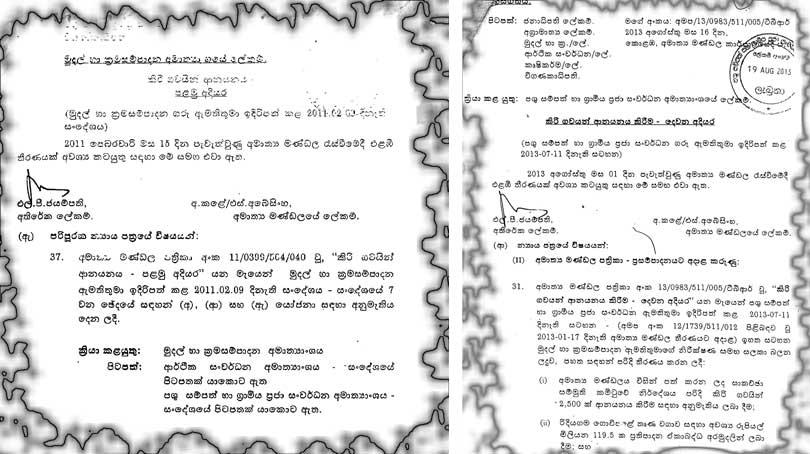
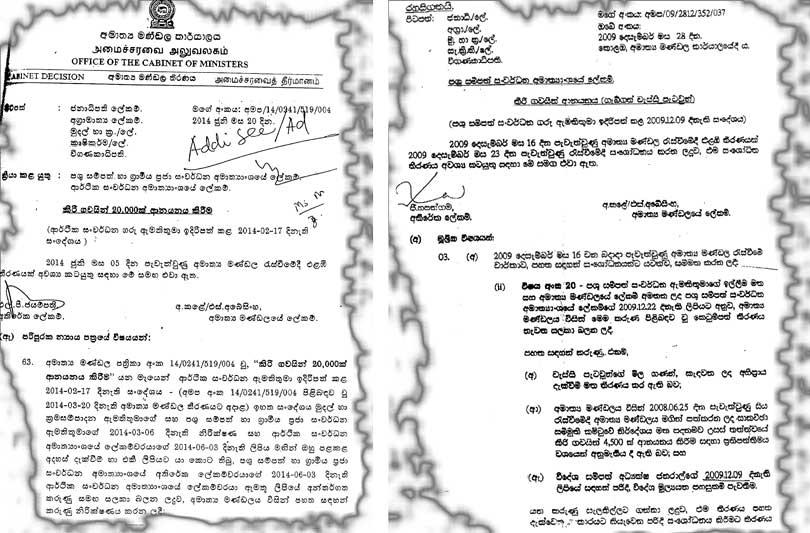
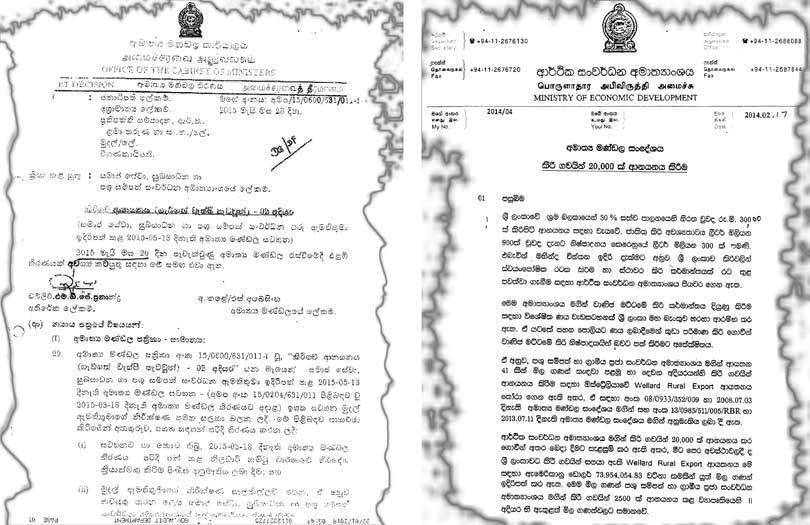
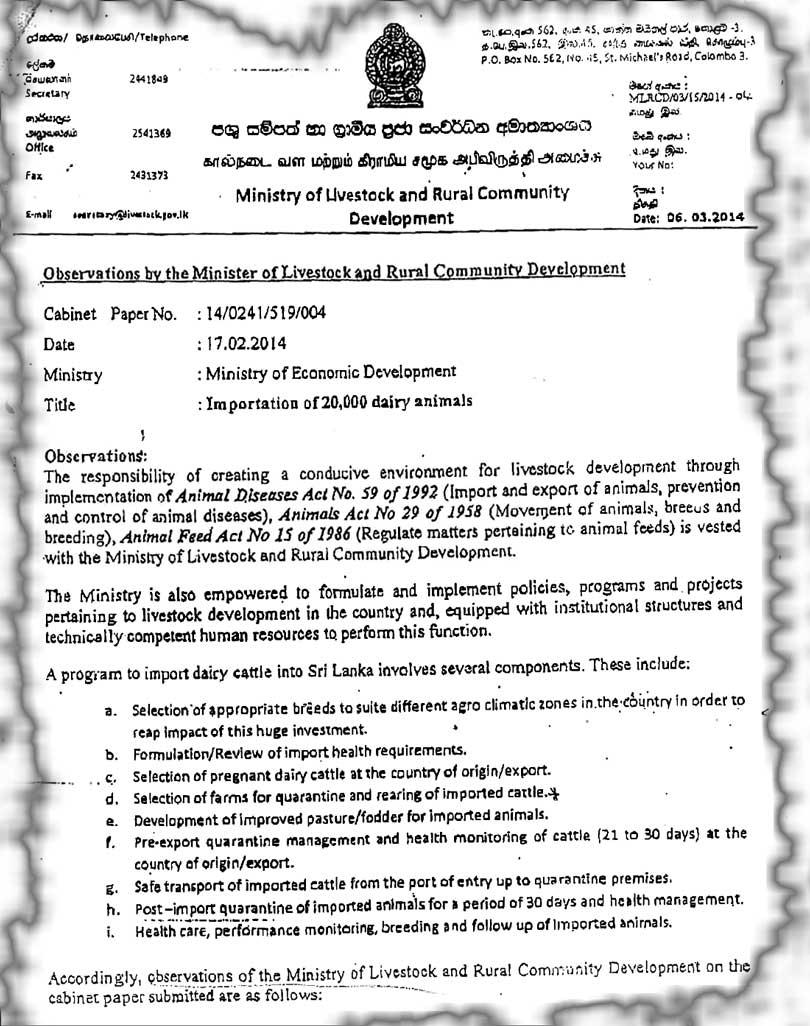
Humorous stories
There are many humorous stories regarding the distribution of dairy cows project. One factor is that there was no proper supervision regarding the farms where dairy cows were kept after being imported at a huge cost. It was proved at the time when a group of auditors from the Department of the Auditor General paid a visit to carry out an audit of the farms in October 18, 2017. When the auditors went to a place where 20 cows were said to be housed as mentioned in the list, there was no farm in that address. That was the place where Gannoruwa Veterinary Research Institute was established.
Many dairy cows had contracted the disease called ‘mastitis’ when they were handed over to the farms. Due to the lapse of failing to take suitable steps to deal with the condition of these animals, when imported to the country, this disease had spread among the other animals. Even though the Government claimed that 15 litres of milk could be obtained per day from a cow, the cows didn’t even produce even a drop of milk. The reason was that their condition was unhealthy. The nipples of a large number of cows given to the farms were dead or inactive.
These cows are said to have been imported during pregnancy, but they were not pregnant and their fetuses had died due to diarrhea.
Successful experienced farmers became indebted; owing millions in rupees to others. Several dairy farmers were so much in debt that they had to see their houses being foreclosed.
The Government did not learn a lesson from it. The ministry set their foot forward and imported 3024 cows during the third stage. The problem grew out of proportion as a result.
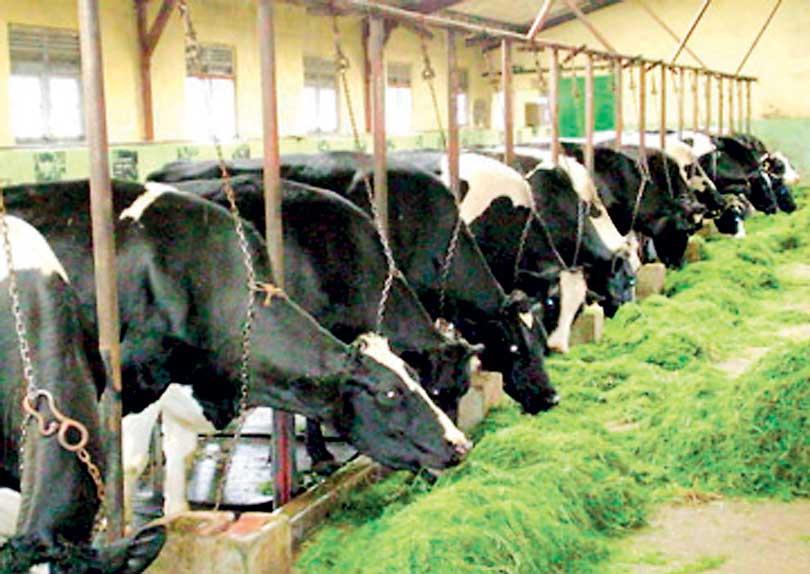
(Courtesy Daily Lankadeepa)
23 Dec 2024 1 hours ago
23 Dec 2024 2 hours ago
23 Dec 2024 2 hours ago
23 Dec 2024 3 hours ago
23 Dec 2024 3 hours ago